

Amarna letters. EA 161, letter by Aziru, leader of Amurru, (stating his case to pharaoh), one of the Amarna letters in cuneiform writing on a clay tablet.
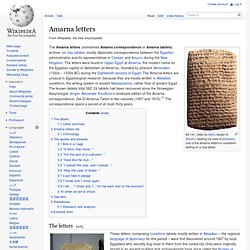
The Amarna letters (sometimes Amarna correspondence or Amarna tablets) archive, on clay tablets, mostly diplomatic correspondence between the Egyptian administration and its representatives in Canaan and Amurru during the New Kingdom. The letters were found in Upper Egypt at Amarna, the modern name for the Egyptian capital of Akhetaten (el-Amarna), founded by pharaoh Akhenaten (1350s – 1330s BC) during the Eighteenth dynasty of Egypt.
Ataraxia. "Ataraxia" (ἀταραξία, "tranquility") is a Greek term used by Pyrrho and Epicurus for a lucid state of robust tranquility, characterized by ongoing freedom from distress and worry.[1] Epicureanism[edit] For Epicureanism, ataraxia was synonymous with the only true happiness possible for a person.

Lucretius. Titus Lucretius Carus (/ˈtaɪtəs lʊˈkriʃəs/; c. 99 BC – c. 55 BC) was a Roman poet and philosopher.
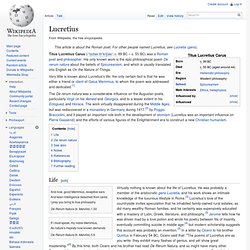
His only known work is the epic philosophical poem De rerum natura about the beliefs of Epicureanism, and which is usually translated into English as On the Nature of Things. The De rerum natura was a considerable influence on the Augustan poets, particularly Virgil (in his Aeneid and Georgics, and to a lesser extent in his Eclogues) and Horace. The work virtually disappeared during the Middle Ages, but was rediscovered in a monastery in Germany during 1417, by Poggio Bracciolini, and it played an important role both in the development of atomism (Lucretius was an important influence on Pierre Gassendi) and the efforts of various figures of the Enlightenment era to construct a new Christian humanism. Life[edit] And now, good Memmius, receptive ears And keen intelligence detached from cares I pray you bring to true philosophy De Rerum Natura (tr. De Rerum Natura (tr. Ovid. Ovid is traditionally ranked alongside Virgil and Horace, his older contemporaries, as one of the three canonic poets of Latin literature.
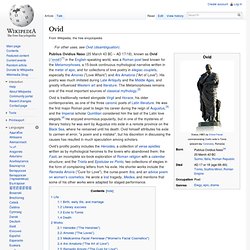
He was the first major Roman poet to begin his career during the reign of Augustus,[3] and the Imperial scholar Quintilian considered him the last of the Latin love elegists.[4] He enjoyed enormous popularity, but in one of the mysteries of literary history he was sent by Augustus into exile in a remote province on the Black Sea, where he remained until his death. Ovid himself attributes his exile to carmen et error, "a poem and a mistake", but his discretion in discussing the causes has resulted in much speculation among scholars.
Livy. Life[edit] Titus Livius probably went to Rome in the 30s BC, and it is likely that he spent a large amount of time in the city after this, although it may not have been his primary home.
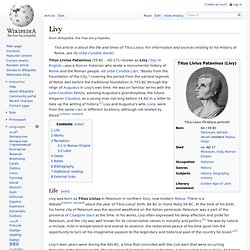
During his time in Rome, he was never a senator nor held any other governmental position. His elementary mistakes in military matters show that he was never a soldier. However, he was educated in philosophy and rhetoric. It seems that Livy had the financial resources and means to live an independent life. Livy was known to give recitations to small audiences, but he was not heard of to engage in declamation, which was a common pastime. Perhaps Livy’s most famous work was his history of Rome. Titus Livius is said to have died in the year AD 17 (three years after the death of the emperor Augustus) in his home city of Patavium. Works[edit] Reception[edit] In Roman Empire[edit] I am said to have praised Brutus and Cassius, whose careers many have described and no one mentioned without eulogy.
Catullus. Modern bust of Catullus on the Piazza Carducci, Sirmione.[1] Not to be confused with Romans named "Catulus", see Catulus.
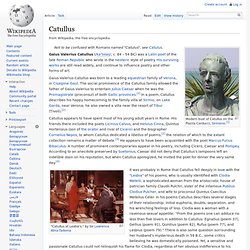
Gaius Valerius Catullus (/kəˈtʌləs/; c. 84 – 54 BC) was a Latin poet of the late Roman Republic who wrote in the neoteric style of poetry. His surviving works are still read widely, and continue to influence poetry and other forms of art. Catullus appears to have spent most of his young adult years in Rome. His friends there included the poets Licinius Calvus, and Helvius Cinna, Quintus Hortensius (son of the orator and rival of Cicero) and the biographer Cornelius Nepos, to whom Catullus dedicated a libellus of poems,[2] the relation of which to the extant collection remains a matter of debate.[3] He appears to have been acquainted with the poet Marcus Furius Bibaculus.
There survives no ancient biography of Catullus: his life has to be pieced together from scattered references to him in other ancient authors and from his poems. Poetry[edit] Cicero. Marcus Tullius Cicero (/ˈsɪsɨroʊ/; Classical Latin: [maːrkʊs tʊlliʊs ˈkɪkɛroː]; Ancient Greek: Κικέρων Kikerōn; 3 January 106 BC – 7 December 43 BC; sometimes anglicized as Tully[1] /ˈtʌli/), was a Roman philosopher, politician, lawyer, orator, political theorist, consul and constitutionalist.
He came from a wealthy municipal family of the Roman equestrian order, and is widely considered one of Rome's greatest orators and prose stylists.[2][3] Petrarch's rediscovery of Cicero's letters is often credited for initiating the 14th-century Renaissance in public affairs, humanism, and classical Roman culture.[7] According to Polish historian Tadeusz Zieliński, "Renaissance was above all things a revival of Cicero, and only after him and through him of the rest of Classical antiquity.